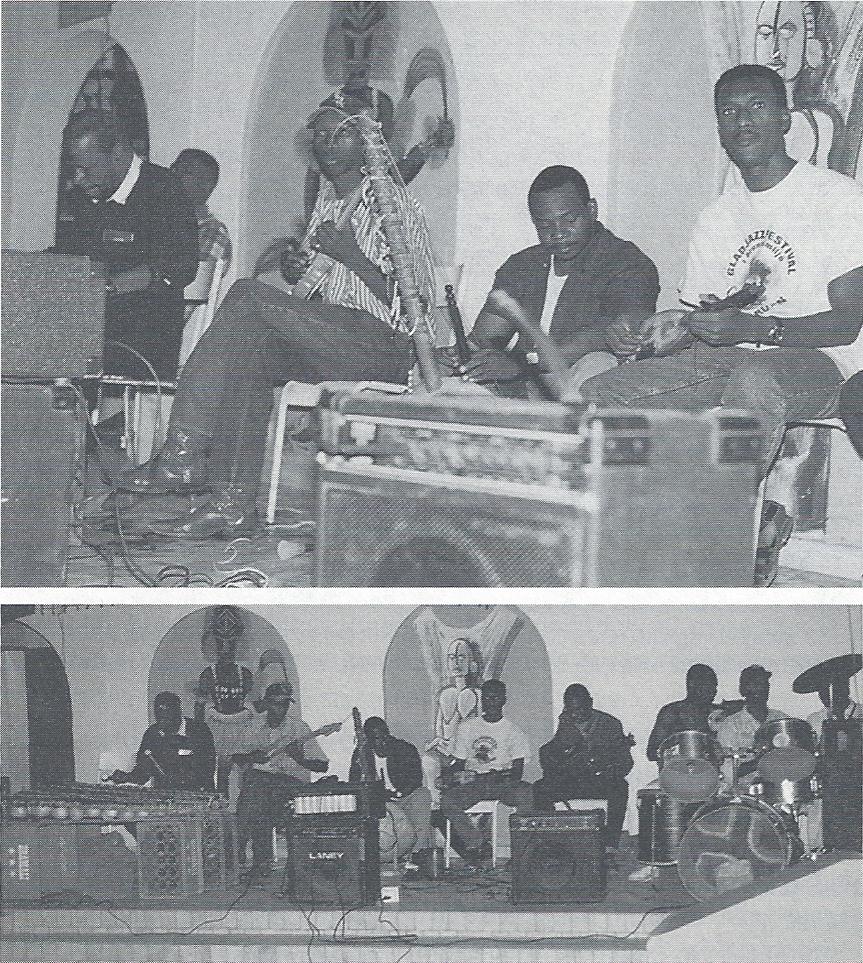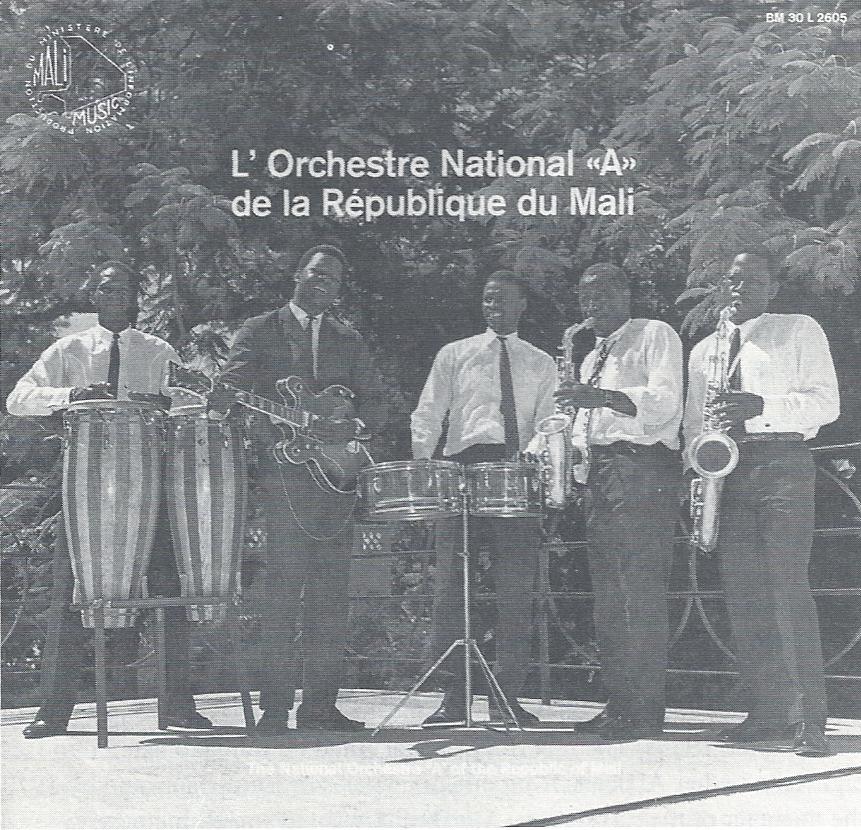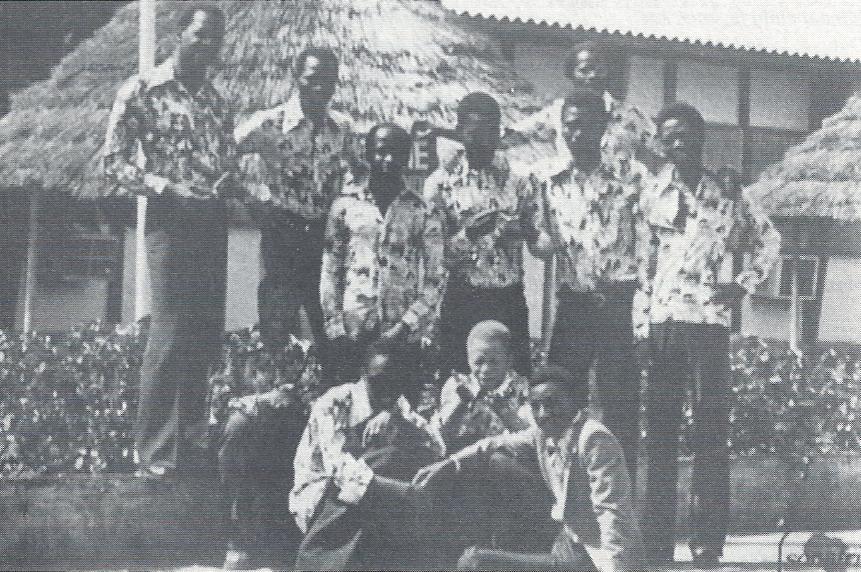Keletigui Diabate
Biographical Information
Born: Mali; Kita, 1931
Died: Mali; Bamako, 2012
References
Charry, Eric. 2000. Mande Music: Traditional and Modern Music of the Maninka and Mandinka of Western Africa. Chicago; London: University of Chicago Press.
pp. 25-6
The elderly Keletigui Diabate playing two balas that can emulate the European twelve-tone scale in an ensemble of musicians thirty to fourty years his junior, including Toumani Diabate, koni player Basekou Kouyate, a vocalist, and electric bass, electric guitar, tama, and drum set players, has been a familiar image for Bamako residents in the mid-1990s (plate 3). Diabate is grounded in the bala tradition, and he also occasionally pulls out a trombone to blow a jazz-oriented solo with this group. He has played electric guitar with state orchestras in Mali and Guinea at the dawn of independence (plate 44), violin with Mali's renowned Les Ambassadeurs in the 1970s (plate 45), and bala with Salif Keita in the 1990s. In a corner of the courtyard of his home, carved wooden bala slats are smoked dry in preparation for attachment to bamboo frames to be played with wooded mallets partially wrapped in rubber tapped from trees, a fabrication process used by his bala-playing ancestors for centuries.

Plate 3 Symphonie Mandingue. Top (left to right): Keletigui Diabate (bala), Mamadou "Santiago" Kouyate (guitar), Toumani Diabate (kora), Basekou Kouyate (koni). Bottom (left to right): same as above with Djibril Camara (bass), unidentified tama player and drummer. Club L'Hogon, Bamako, 1997. Photos by the author.
p. 254
17. Multi-instrumentalist Keletigui Diabate was the first guitarist in Orchestre de la Garde Républicaine and was replaced by Diara Kante in 1961 when he returned to his native Mali.
pp. 268-70
One of the most influential orchestral musicians during the 1960s was multi-instrumentalist Keletigui Diabate (1931-).
Immediately after Mali had become independent [1960], her young generation, through the . . . Board of Youth and Sports, decided to form a national orchestra. . . . [It] is dominaced by that great figure, Kélétigui [Diabate], the orchestra-man, the leader of this formation. . . . At the age of seven this artist born at Kita (the cradle of the greatest musical traditions of the country) already was a virtuose on the balafon. . . . As his closest admirers suggested to him to try his hand at the modern instruments (the guitar, for example) in order to prepare a career for himself, Kélétigui began to travel across Western Africa in search of instructors and, above all, of a style appropriate to his development. Thus he stayed several times in Senegal, Guinea, and Ivory Coast before definitely returning to this country in 1960.
For virtuoso Kélétigui Diabate these journeys have been very productive of learning: he has become master in the arts of playing the guitar, the trumpet, the flute, the saxophone, the counter-bass. But he is fondest of his guitar, which he plays as soloist in the "A" formation of the National Orchestra, in a style reminiscent of the late Guinean guitar-player Facély Kante. (English notes to Orchestre National "A" de la Republique du Mali 1972-disc)28
Diabate apprenticed as a guitarist in the Guinean Orchestre de la Garde Républicaine when it was first created, and he returned to Mali just after independence to help form Mali's own national orchestra (plate 44). His younger brother Daouda Diabate played and recorded with Les Ballets Africains, and Keletigui appears to have been influenced by guitarist Facelli Kante. Just as the order was given in Guinea to create a dance orchestra rooted in local traditions, so it was in Mali. Modernization as defined in Guinea and Mali was based on this process of assimilating local traditions into Latin American—based dance orchestras. Keletigui's role in Mali may have been similar to that of Papa Diabate in Guinea, who initiated a generation of electric guitarists.
I was put in charge of the Premier Formation du Mali (Orchestre national, Number One); it was me who introduced. Manding and Bambara songs played on modern instruments. The idea was to make traditional music, but in a modern way. At the time (the early '60s), we received delegations from Europe, or other African countries, and at such occasions we'd perform our traditional ceremonies. Each time we received a European delegation, an official reception would be arranged, and those delegates, they couldn't dance our traditional dances. So we had to find international rhythms and put our traditional sound within that, using a (kit) drum and so on. (Keletigui Diabate, in Prince 1989b:17)

Plate 44 Orchestre National "A" de la République du Mali, about 1970. Keletigui Diabate playing the guitar. From Orchestre National "A" de la République du Mali (1972-disc).
28. Keletigui Diabate (in Prince 1989b:19) has reported that he was in Guinea from 1957 to 1961.
p. 273

Plate 45 Les Ambassadeurs (1977a/b-disc). Bottom row (seated left to right): Moussa Cissoko, Amadou Bakayoko, Salif Keita, Dama; top row (standing left to right): Keletigui Diabate, Modibo Cone, Ousmane Dia, Kabine "Tagus" Traore, Issa Niare, Idrissa Soumaoro (with glasses), Manfila Kante.
p. 275
Les Ambassadeurs were joined by Keletigui Diabate in the mid-1970s for some of their recordings, but he remained in Mali when they left for Abidjan.
p. 295
In Guinea there is a special relation between the bala and the guitar. Many guitar players started out on the bala, and many bala players also play the guitar. Some musicians, such as Ibrahima Soumano, Kemo Kouyate, and Keletigui Diabate, have even recorded on both instruments.
56. Among the guitarists who studied the bala are Keletigui Diahate (Prince 1989b:17), Sekou "Bembeya" Diahate (Stapleton and May 1990:110), Sona Diabate (Anderson 1990:27), and Manfila Kante "ex-Ambassadeurs" (Duran 1991:21). Keletigui Diabate reproduces the European equal-tempered tuning system by using two balas, one placed behind the other, so that he can get all twelve tones of the scale (see his performances with Salif Keita's group in Finch 1989-vid, Austin 1991-vid, and Perry 1991-vid and his solo demonstration in Kidel and Marks 1990-vid).
Discography
Les Ambassadeurs. 1975. Kante Manfila et les Ambassadeurs. Ambassadeur, Mana Mana. 45 rpm single. Sonafric. SAF 1725.
[No Pieces Indexed]
———. 1975. Les Ambassadeurs du Motel. Super pitie, Bolola sanou. 45 rpm single. Sonafric. SAF 1773.
[No Pieces Indexed]
———. 1976. Les Ambassadeurs du Motel. Saranfing, Sabar. 45 rpm single. Sonafric. SAF 1786.
[No Pieces Indexed]
———. 1976. Les Ambassadeurs du Motel. Sonafric. SAF 50014.
———. 1977. Les Ambassadeurs du Motel de Bamako. Vol. 1. Yassoumouka, Fatema, Super pitie, Bolola sanou, Mali denou, Sabar, Saranfing. Sonafric. SAF 50030.
[No Pieces Indexed]
———. 1977. Les Ambassadeurs du Motel de Bamako. Vol. 2. N'Na, Nagana, M'Bouram mousso, Salimata, Ray m'bote, Djoula, Tiecolomba. Sonafric, SAF 50031.
[No Pieces Indexed]
Diabate, Adama. 1995. Jako Baye. Stern's Africa, STCD 1062.
[No Pieces Indexed]
Diabate, Keletigui. 1996. Keletigui Diabate. Mission de Coopération Française au Mali, CF 9603. Cassette.
[No Pieces Indexed]
———. 2004. Sandiya. Contre-jour, CJ012.
· fassond; kulanjand; jarabid; janjond; nan koman jand; sunjatad
Diabate, Toumani. 1994. Songhai 2. Hannibal, HNCD 1383.
· mali sajod
———. 1995. Djelika. Hannibal, HNCD 1380.
Kaira Ben. 1996. Singa. Stern's/Djenne, STCD 1072.
· mansani cissed
Keita, Salif. 1991. Amen. Mango, 162 539 910-2.
Koita, Ami. 1986. Tata Sira. Editions Bolibana, 42079-2.
———. 1986? Ami Koita: Debe. Disques Esperance, ESP 7517.
· janjond
———. 1989. Ami Koita. MSAC/BMDA, BM 89. Cassette.
· jarabid
Kouyate, Tata Bambo. 1985. À Paris 1985: Hommage à Baba Cissoko. SA 300058. Reissued in 1989 as Jatigui, Globestyle, CD ORB 042.
Kouyate, Wande. n.d. Bara Muso. E02871191-4.
[No Pieces Indexed]
Tounkara, Assita, and Bakaroba Diabate. n.d. Fourou. SAM077192-4.
[No Pieces Indexed]
Various Artists. 2006. Midnight in Mali. Stern's Africa, STCD1102.
· makid; mansani cissed; suwaresid
———. n.d. Symphonie Mandingue au Daniel Sorano a Dakar. Production Elite, DK76. Cassette.
· jarabid; kulanjand; mali sajod; sunjatad
Videography
· janjonv